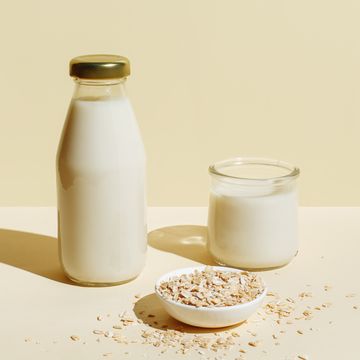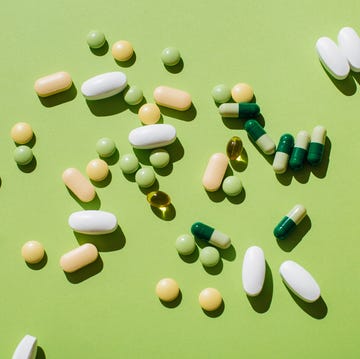Did you know that up to 60% of the human body is made up of water? No wonder hydration is so vital to every single cell in our body. Staying hydrated daily has a slew of benefits, from optimizing your metabolic rate to lubricating your joints.
If you're tired of plain tap water, there are several other options available for you. Mineral water (brand names like Topo Chico, Perrier, Gerolsteiner, and San Pellegrino may ring a bell) is a way to hydrate the body while also getting a boost of nutrients. Here's everything you need to know about mineral water, including the benefits and potential disadvantages.
First, what is mineral water?
Mineral water comes from a protected mineral spring, and is rich in several nutrients including (but not limited to) magnesium, calcium, potassium, and even iron. I like to call it nature's electrolyte water.
According to the Food and Drug Administration, "mineral water shall be distinguished from other types of water by its constant level and relative proportions of minerals and trace elements at the point of emergence from the source, due account being taken of the cycles of natural fluctuations. No minerals may be added to this water."
Certain varieties of mineral water are sparkling, but not all. Since mineral water is packed with these nutrients, it tends to have a different taste from tap and filtered water.
Is mineral water better than tap?
Believe it or not, most tap water does in fact contain minerals, but this can vary greatly by region. If you're curious about the quality of your tap water, you should receive an annual report from the Environmental Protection Agency on the public water quality in your area every summer. This report provides information including where your water comes from, a list of regulated contaminants and their levels, as well as potential health effects from consuming contaminated water.
Tap water comes from either surface or underground sources, and minerals are added. Mineral water on the other hand is naturally full of minerals and is bottled at the source, but may undergo some processing. Since it is straight from the reservoir, it does not have any minerals added.
What are the health benefits of drinking mineral water?
In general, there are a slew of benefits associated with the hydration factor of mineral water alone. Preventing dry mouth, keeping the body cool, improving sleep quality and mood, and even helping to manage your weight are on the list of hydration benefits. Since so many of us mistake hunger for thirst, properly hydrating can help you become more in tune with your body and also help optimize your metabolic rate.
Sodium, potassium, and magnesium are the three big electrolytes found in mineral water that play a huge role in your overall health and regulating your bodily systems. These nutrients can assist in managing blood pressure, controlling muscle contraction, and even promoting blood circulation. They also help to combat muscle cramps, fatigue, and dehydration.
Magnesium specifically also has digestive benefits, as it relaxes the bowels and actually helps to pull water into the intestines; this in turn can help alleviate constipation and keep you regular. The calcium content in mineral water also has benefits, specifically in helping to promote strong bones and blood clotting.
Are there any disadvantages of mineral water?
Mineral water is generally considered safe with a few small exceptions. Most mineral water available in the United States is from Europe. Since the mineral water can come from varying springs located in different parts of the world, the mineral content can vary greatly by region. This means that certain brands of mineral water can be very high in sodium (like Vichy in particular), so it's something to keep in mind if you are dealing with high blood pressure.
If you have renal failure, you'll want to be careful with drinking mineral water as it can be abundant in potassium, a nutrient normally healthy for the body, but when kidneys fail they can no longer remove excess potassium, so monitoring your intake is important and mineral water may provide an unexpected but major source of potassium if consumed regularly.
For the general population, mineral water is safe to consume and can have a slew of health benefits. As a natural source of electrolytes, it's a great and delicious way to effectively hydrate the body.
Stefani (she/her) is a registered dietitian, a NASM-certified personal trainer and the director of the Good Housekeeping Institute Nutrition Lab, where she handles all nutrition-related content, testing and evaluation. She holds a bachelor’s degree in nutritional sciences from Pennsylvania State University and a master’s degree in clinical nutrition from NYU. She is also Good Housekeeping’s on-staff fitness and exercise expert. Stefani is dedicated to providing readers with evidence-based content to encourage informed food choices and healthy living. She is an avid CrossFitter and a passionate home cook who loves spending time with her big fit Greek family.













